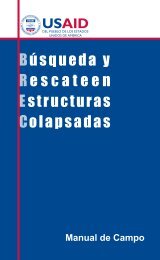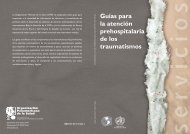Humanitarian Supply Management and Logistics in the Health Sector
Humanitarian Supply Management and Logistics in the Health Sector
Humanitarian Supply Management and Logistics in the Health Sector
Create successful ePaper yourself
Turn your PDF publications into a flip-book with our unique Google optimized e-Paper software.
The way <strong>in</strong> which <strong>in</strong>ternational donors transfer resources for humanitarian<br />
assistance has led to <strong>the</strong> emergence of many new relief organizations<br />
<strong>and</strong> <strong>the</strong> entrance of exist<strong>in</strong>g <strong>in</strong>stitutions <strong>in</strong>to this field, result<strong>in</strong>g <strong>in</strong><br />
<strong>in</strong>tense competition among <strong>the</strong>se organizations for external resources.<br />
In spite of this competition, it is essential to develop mutual support <strong>and</strong><br />
cooperation agreements, so that humanitarian assistance can be delivered<br />
promptly <strong>and</strong> relief efforts can complement each o<strong>the</strong>r. These<br />
agreements must be both specific <strong>and</strong> feasible, so as not to create false<br />
expectations.<br />
Requests for <strong>Humanitarian</strong> Assistance<br />
Calls on <strong>the</strong> International Community<br />
Chapter 4: Coord<strong>in</strong>ation 25<br />
When <strong>the</strong> impact of a disaster is such that it overwhelms national<br />
response capacity, a call for help soon goes out to <strong>the</strong> <strong>in</strong>ternational community.<br />
This is <strong>the</strong> responsibility of <strong>the</strong> national government, <strong>and</strong> <strong>the</strong><br />
requests for assistance are usually channeled by embassies <strong>and</strong> <strong>the</strong> country<br />
offices of <strong>the</strong> various UN bodies. The crucial po<strong>in</strong>t, aga<strong>in</strong>, is not to<br />
make such requests until needs have been assessed <strong>and</strong> it is clear that<br />
<strong>the</strong>y cannot be met with local resources. Only <strong>the</strong>n can <strong>in</strong>ternational solidarity<br />
provide emergency relief that is truly useful.<br />
As part of disaster preparedness efforts, <strong>the</strong> foreign m<strong>in</strong>istries of some<br />
countries—regrettably few—have issued guidel<strong>in</strong>es to <strong>the</strong>ir diplomatic<br />
representatives abroad <strong>in</strong> <strong>the</strong> event of a disaster. These guidel<strong>in</strong>es are<br />
meant to help <strong>the</strong> diplomats <strong>in</strong>form <strong>the</strong> authorities, potential donors, <strong>and</strong><br />
<strong>the</strong> public about <strong>the</strong> impact of <strong>the</strong> event, <strong>the</strong> needs of <strong>the</strong> victims, <strong>and</strong><br />
<strong>the</strong> type of assistance that would prove most valuable <strong>in</strong> <strong>the</strong> circumstances,<br />
based on official reports issued by those responsible for disaster<br />
response.<br />
Ideally, this should help to identify <strong>and</strong> screen aid offers, reduc<strong>in</strong>g <strong>the</strong><br />
number of <strong>in</strong>appropriate donations <strong>and</strong> help<strong>in</strong>g to make sure that useful<br />
supplies arrive when <strong>and</strong> where <strong>the</strong>y are most needed.<br />
Similarly, <strong>the</strong> country offices of <strong>in</strong>ternational organizations may call on<br />
headquarters or o<strong>the</strong>r counterparts <strong>in</strong> <strong>the</strong> region to provide humanitarian<br />
assistance. Normally, <strong>the</strong>se organizations have <strong>the</strong>ir own procedures






